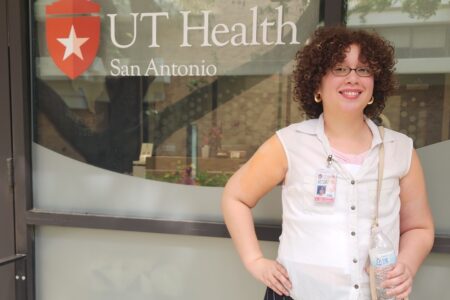
Share On Social!
Editor’s Note: This post is part of an ongoing series that will highlight the Robert Wood Johnson Foundation’s work in Latino communities across the country.

When his only child Emilio died of cancer shortly before his sixth birthday, Richard Nares found his world was shattered. As he and his wife tried to put their lives back together, Nares realized his priorities had changed.
“All I wanted to do was help other families who were going through what we went through,” said Nares, who was an artist and picture framer.
Putting his family’s tragedy and hard-earned knowledge to use, Nares and his wife Diane established the Emilio Nares Foundation to transport underprivileged families whose children are battling cancer to their medical visits at Rady Children’s Hospital in San Diego. “We’ve been in their shoes,” said Nares, referring to the parents. “We’re reliable. They trust us. We don’t miss a day and they know that. And we’re bilingual.” Today Nares’ foundation serves thousands of families each year with transportation to and from medical visits, multiple education and support programs, cooking classes, and knitting and sewing groups.
For developing a successful model to support and transport low-income families with children battling cancer to medical visits, Nares has been named one of 10 recipients of the Robert Wood Johnson Foundation Community Health Leaders Award. The award honors exceptional men and women who have overcome significant obstacles to tackle some of the most challenging health and health care problems facing their communities.
Nares’ own experience with his son Emilio gave him a unique perspective on what families need to help their child battle cancer. “When your child has cancer, his immune system is suppressed. It is dangerous for him to ride public transportation and sit next to someone who has a cold,” said Nares, who started out by using his own car to transport families until he was overwhelmed with requests. “I met a mom whose son had a brain tumor. She had to leave her home at 4:30 in the morning and change buses five times to get to the hospital by 9 a.m. Imagine what a horrific travel experience that was for her and her 2-year-old,” he said, which is why his program’s vans are sterilized and fully stocked with snacks, cleaning materials, and towels to help when the children suffer reactions to chemo or other treatments.
Community Health Leaders National Program Director Janice Ford Griffin said that the selection committee honored Nares for his “nonstop caring and commitment” to helping needy families with children battling cancer. “Richard Nares’ attention to details that may seem small yields big differences for families of children stricken by cancer. Safe, reliable, and comfortable transportation to and from the hospital is too often taken for granted and is the linchpin of prescribed and uninterrupted therapies and good outcomes,” Griffin said. “As he observed the families’ needs for more support, he has stepped forward to organize and provide an array of services for a population whose challenges are exacerbated by the lack of effective public transportation.”
According to Nares, his greatest challenge each day is to make sure that parents take an active role in their children’s health care. “It’s very important to be your child’s advocate as they battle cancer,” Nares said. “You know best how they’re feeling and how they are reacting to medication. Parents can feel intimidated by doctors, but we teach them: write down questions, make sure you have an interpreter if you need one, and demand answers.”
Rady Children’s Hospital Chief Executive Officer Margareta F. Norton said of Nares, “Richard is often seen around campus. Whether he is driving patients to appointments, helping staff the resource center, or speaking with staff, Richard is constantly available and interested to learn about the needs of the children and families in our care. He has helped us to promote and offer a variety of support services in the hospital in a way that only a parent could understand. It is this interest and pride in his work that are his greatest contributions to our community.”
For Nares, his work is his inspiration, “I look at these children and they remind me of my son. When I see the parents’ stress and fear, it’s like looking in a mirror.” Yet Nares continues to look forward. “I want doctors to ask the kids how they are feeling. I want parents to know that they are not alone and that someone is here to help,” Nares said.
RWJF has honored more than 190 Community Health Leaders since 1993. The work of the nine other 2011 recipients includes a project to help people with disabilities safely and confidently handle routine medical exams in Delaware; a community initiative to ensure access to medical care in the Kansas farm belt; a campaign for early detection and treatment of breast cancer for uninsured and underserved women in Miami; a nurse training program for disadvantaged Hawaiian students; a home health aide service for elderly Asian Americans in suburban Philadelphia; a rural community health outreach program in the Delta region of Arkansas; an anti-hunger and nutrition program in New Brunswick, N.J.; health education for Mexican Americans in Brooklyn, N.Y.; and health care for the working poor in Altoona, Pa.
For more information, visit www.communityhealthleaders.org.
By The Numbers
25.1
percent
of Latinos remain without health insurance coverage



